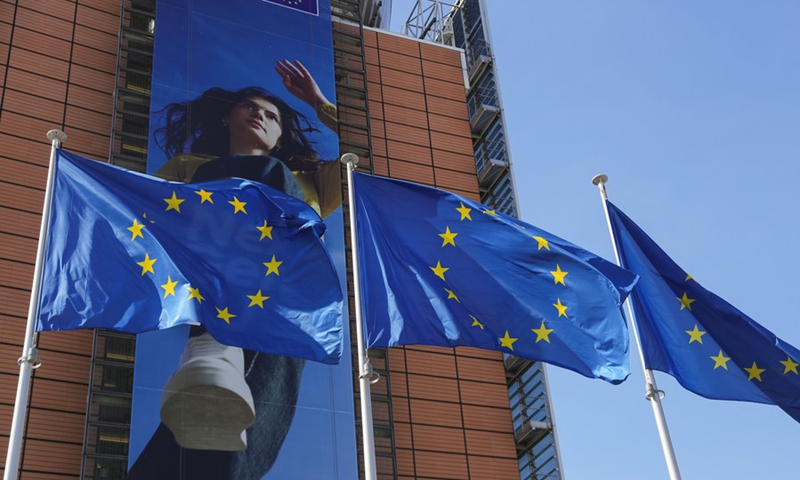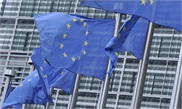
European Union flags fly outside the European Commission building in Brussels, Belgium, on June 9, 2021.(Photo: Xinhua)
The European Commission on Wednesday proposed a new trade instrument that would turn the bloc into a controversial countermeasure bullet launcher on the grounds of its vaguely defined "coercive" practices by non-EU economies, a move that international affairs observers warn could downgrade the EU from a free trade supporter to an epicenter of non-compliance with trade fairness.
The new anti-coercion measure, proposed amid a growing row between China and Lithuania and the Taiwan question is essentially a politically oriented tool envisioned by the Commission to prove its geopolitical clout, experts said, reckoning that such a high-risk trade policy approach would put the 27-member bloc and a galaxy of businesses from the grouping at stake.
It is noteworthy that the instrument, purportedly intended to close a loophole in EU governance that exploits divisions between member states for countermeasures to be imposed by unanimity, actually turns out to be a source of divisions itself, with an apparent rift among member countries sowing the seeds of skepticism, according to media reports.More ironically, as observers put it, the proposed new weapon suggests that the EU would be at odds with the US - its most intimate ally that is best known for various coercive practices.
Controversial plan
The Wednesday endorsement is seen as bringing an initiative dating back to September 2020 a step closer to reality as the EU seeks to create a new legislative measure designed to deter and counteract coercion by third-party countries. But such a vaguely phrased attempt, unveiled amid the China-Lithuania dispute and facing skepticism both internally and outside the bloc, is increasingly shown to be a proposal of concern, experts said, criticizing the move as an instance of political distortions of trade.
The new tool "strengthens the EU's toolbox and will allow the EU to better defend itself on the global stage," the European Commission said Wednesday in a statement on its website announcing the proposal.
"The anti-coercive bill, which is by its essence vaguely defined as regards coercion, indicates politically motivated interference with trade," He Weiwen, a former senior Chinese trade official, told the Global Times on Wednesday.
Under the proposal, "economic coercion" refers to a situation where a non-EU country is seeking to pressure the EU or a member state "into making a particular choice by applying, or threatening to apply, measures affecting trade or investment," read a separate question and answer section posted on the commission's website, adding that whether a third country's action is considered as coercion would be decided case by case.
The EU is a WTO member, meaning it is supposed to abide by WTO rules of unconditional and non-discriminative most-favored-nation principle, while the new tool is arguably going the other way around, He commented, admonishing the EU - that has long been recognized as one of the most open economies globally - against backtracking on free trade.
Describing the proposal of the new policy weapon as an attempt by Brussels to increase the EU's geopolitical heft, a Politico report on Monday said the new instrument would empower the EU to allow the imposition of sanctions more easily on economic rivals, including China.
The proposal only necessitates a qualified majority among EU members rather than unanimity, media reported.
Among the response measures under the instrument are "classical measures related to the fields of goods and services, but also of intellectual property rights and foreign direct investment." In addition, restrictions on access to the EU market, such as public procurement, capital, as well as access to EU-funded research programs are considered, per the Q&A section.
The proposal will still need to be "discussed and agreed by the European Parliament and the Council of the European Union," according to the Wednesday statement. Further feedback from stakeholders and citizens is expected over the next two months.
The plan comes after Lithuania hyped the concept of claimed "economic coercion" by China, and the EU looks to send a signal internally - via the passage of the bill - to show the bloc's unity and sooth the nerves of the Baltic country, Cui Hongjian, director of the Department of European Studies at the China Institute of International Studies, told the Global Times on Wednesday.
The new trade weapon "could be used in the dispute between China and Lithuania," the Financial Times reported Tuesday, citing unidentified officials.
Lithuanian Foreign Minister Gabrielius Landsbergis on Friday appealed to the EU, saying that the Baltic country would seek assistance from the European Commission amid its row with China over the Taiwan question.
Lithuania has recklessly provoked the internationally recognized one-China principle and allowed Taiwan island's separatist authority to set up a representative office in Lithuania. In response, China has downgraded the diplomatic relations with Lithuania to the level of charge d'affaires.
Irony as weapon against coercion
The Lithuania element, nevertheless, is by no means a decisive part of the plan. Analysts said the bill will likely face great hurdles when pressing ahead internally, as some members could have a lot of disputes over levying the tool due to conflicts of interests.
"If the plan is carried out and elevated to the height of the EU, every member country would be kidnapped by the interests of Lithuania. Are the EU members willing to sacrifice their economic ties with China just to show support to the plan, especially those whose economic connectivity with China is of sheer size?" Cui said.
The road map to the proposal of the new anti-coercion mechanism also portrays discrepancies among EU member states as many are haunted by reckless aftermaths of the proposed instrument.
Initially announced by European Commission President Ursula von der Leyen in September 2020, the "instrument to deter and counteract coercive actions by third countries" underwent a public consultation in March through June to seek input on the new legal tool.
According to summary results of 48 valid contributions to the public consultation, published on the commission's website, "the majority found the following likely or very likely: risking harm to political and economic relations with non-EU countries, a risk of escalation and retaliation, direct costs for businesses and consumers if countermeasures are applied, and administrative burden in relation to implementation of countermeasures."
Contrary to the illusion, as illustrated by Western media, that the new instrument would insulate the EU from the exploitation of divisions between its member states that inhibits retaliatory sanctions by unanimity, the new mechanism de facto evolves into a source of division itself.
Sweden, the Czech Republic and Estonia are among the members that have questioned the necessity of the instrument, as the WTO is considered more effective than unilateral moves, media reported, and Finland and Italy remain skeptical.
Japan, as an outsider, also urged the bloc to work within WTO rules.
What is more ironic is that the proposed tool actually pits the EU against its biggest ally, the US, an economic coercion patron, experts noted.
"But what is truly called economic coercion? Is it the US' moves to weaponize trade and economic ties, unilaterally levy tariffs on European goods and use long-arm jurisdiction to meddle with others not coercing the EU? Companies from the bloc have been suffering a series of tortures due to Washington's bullying move," Cui asked.
"And how could Brussels label a move by Beijing as alleged economic coercion without any proof or any harm inflicted on EU companies? This is undoubtedly a double-standard," Cui added.


